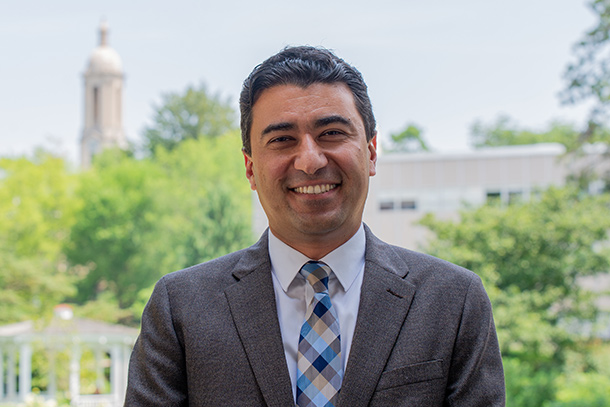
Farshad Rajabipour, the John and Harriette Shaw Professor of Civil and Environmental Engineering, will serve as head of the department of civil and environmental engineering effective July 1, following his efforts as interim department head. Credit: Kate Myers/Penn State.
Farshad Rajabipour named Department of Civil and Environmental Engineering head
June 23, 2025
By Ty Tkacik
UNIVERSITY PARK, Pa. — Farshad Rajabipour, the John and Harriette Shaw Professor of Civil and Environmental Engineering, has been named head of the Department of Civil and Environmental Engineering (CEE), effective July 1. The promotion follows his service as interim department head since July 2023 and as a Penn State CEE faculty member since 2009.
“I’m incredibly honored to be trusted with the position of CEE department head at Penn State and to lead an outstanding team of faculty, staff and students,” Rajabipour said. “While I’ve always taken pride in being a member of the CEE family, the past two years have given me a unique perspective on the tremendous value and impact our department creates. We deliver a world-class civil engineering education, conduct transformative research and provide impactful service to the profession and to communities at home and around the globe.”
CEE has undergone substantial changes, including a move from its historic home at Sackett Building to Penn State’s state-of-the-art ECoRE Building. Throughout this transition, the department has continued producing research, facilitating student success, and offering more opportunities to students and faculty through alumni gifts and support. According to Tonya L. Peeples, the Harold and Inge Marcus Dean of the College of Engineering, Rajabipour has been an important part of that success.
“Farshad has played a pivotal role in guiding CEE faculty and researchers through a time of great transition in the college,” Peeples said. “Despite change, CEE has continued to produce world-class research and provide students with an invaluable education. Much of this success comes as a result of Farshad’s hard work and tenacity, and I’m excited to see how the department continues to evolve under his leadership.”
A CEE faculty member for over 15 years, Rajabipour previously held civil engineering appointments at the University of Hawaii at Mānoa and Purdue University. Rajabipour also served as a visiting faculty member at the Indian Institute of Technology Madras. He obtained his bachelor’s degree in civil engineering from Sharif University of Technology, Iran, in 2000 and his master’s and doctoral degrees in civil engineering from Purdue University in 2003 and 2006 respectively.
As an instructor and researcher, Rajabipour specializes in science and engineering of construction materials. His areas of interest include sustainable and transformative infrastructure, innovative materials including carbon-neutral concrete and ultra-high-performance concrete, sensor development and extending the durability and service-life of transportation and building infrastructure. He received the 2021 Outstanding Research Award from the Penn State Engineering Alumni Society. He is a fellow of the American Concrete Institute and the co-editor in chief of the American Society of Civil Engineers’ Journal of Materials in Civil Engineering.
Rajabipour also directs the U.S. Department of Transportation’s Region 3 University Transportation Center, the Center for Integrated Asset Management for Multimodal Transportation Infrastructure Systems (CIAMTIS). Housed within Penn State’s Larson Transportation Institute, the center connects researchers and educators from seven partner universities across five mid-Atlantic states and the District of Columbia. It facilitates research, education and technology transfer that extends the life of transportation infrastructure like roads, bridges and railways.
Rajabipour said the department’s recent changes have laid a solid foundation for the future of Penn State’s CEE research and education.
“Thanks to the talent, dedication and team mindset of our faculty, staff and students —as well as the invaluable support of our alumni — we are advancing several key initiatives to grow both our enrollment and impact,” Rajabipour said. “We are developing new undergraduate and graduate degrees, offered both in-person and online, as well as modernizing our curriculum to make Penn State the go-to place for learning modern civil engineering, where students can apply the latest technologies to real-world problems. Additionally, we are leading pioneering research in sustainable and resilient infrastructure systems, leveraging AI [artificial intelligence], automation and other advanced tools to accelerate the development and implementation of next-generation solutions.”

